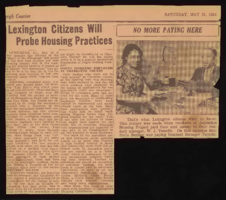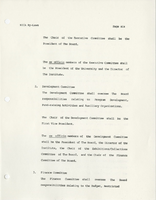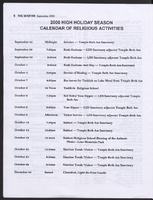Search the Special Collections and Archives Portal
Search Results

Housing Authority of Williamson, West Virginia: scrapbook, work notes, correspondence, and newspaper clippings
Date
Archival Collection
Description
Folder of materials from the Mabel Hoggard Papers (MS-00565) -- Civic engagement file. Includes a scrapbook, work notes, correspondence, and newspaper clippings related to Mabel Hoggard's employment at the Housing Authority of Williamson, West Virginia.
Mixed Content

Tony F. Sanchez III oral history interview: transcript
Date
Archival Collection
Description
Oral history interview with Tony F. Sanchez III conducted by Barbara Tabach and Claytee D. White on August 31, 2018 for the Latinx Voices of Southern Nevada Oral History Project. In this interview, Sanchez describes his role as the Senior Vice President of NV Energy, and his past experience working for Senator Richard Bryan. He discusses his educational background as a University of Nevada, Las Vegas (UNLV) graduate and attending Arizona State University Law School. Sanchez also describes his role as a past president of Latin Chamber of Commerce in Las Vegas, Nevada.
Text
Mancuso, Gus
Gus Mancuso (Ronald Bernard Mancuso), a talented impresario, was born in Spangler, Pennsylvania in 1933. Gus grew up in Hastings, Pennsylvania as the youngest of nine children. His father, an immigrant from Italy, Joseph Mancuso, owned multiple businesses and his mother, Josephine Ceranni toiled as a stay at home mother. Despite his father’s businesses, the family struggled financially. By the eighth grade Gus moved to Rochester, New York, where his mother joined him, after his parents separated.
Person
Neeley, Pearl Francis
Alternate Names
Pearl Francis Neeley was a teacher in rural Nevada during the 1920s, where she taught in various schools throughout Lincoln, Nye, and White Pine counties. She was born on July 27, 1901 in Eagle Valley, Nevada, to Selina Corilla Hammond and David Francis.
Person

Lily Teo oral history interview: transcript
Date
Archival Collection
Description
Oral history interview with Lily Teo conducted by Stefani Evans on February 7, 2022 for Reflections: The Las Vegas Asian American and Pacific Islander Oral History Project. Lily Teo discusses her upbringing in Singapore, her education, her religious beliefs, and converting from Buddhism to Catholicism. She talks about her husband, her early married years, and what life was like as a young mother of three children. Teo shares how she started a catering business to feed construction workers and was responsible for shopping for ingredients, preparing all meals and tea, and cooking the food on site in her temporary kitchen. She talks about her children, the faiths they practice and languages they speak including English, Malay, and Mandarin, and the customs and traditions they practice, such as celebrating Lunar New Year and other holidays. Lily's daughter, Stella, sits in on the interview and expands on her mother's recollections.
Text
Tick Segerblom (Clark County Commisioner) oral history interview conducted by Magdalena Martinez and Taylor Cummnings: transcript
Date
Archival Collection
Description
From the Lincy Institute "Perspectives from the COVID-19 Pandemic" Oral History Project (MS-01178) -- Elected official interviews file.
Text



